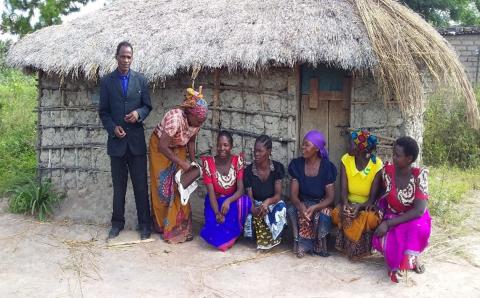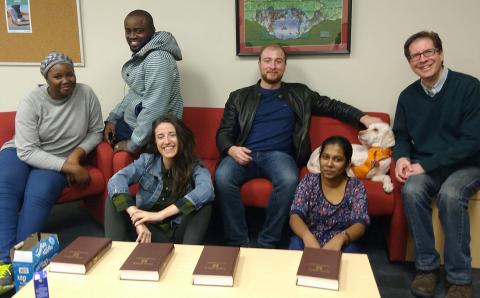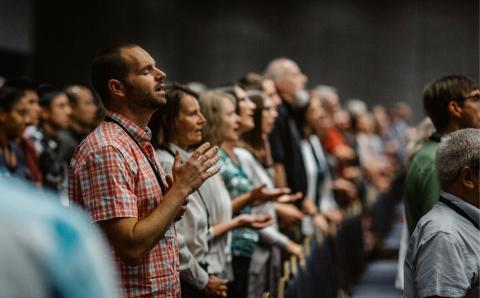“My classwork and my internship have been connected in ways that, after I have learned something in class, I am able to go to the church I am working at and use what I have learned,” said Hannah Saxton, a second-year Master of Divinity student, as she reflected on the various opportunities she has had at Calvin Theological Seminary.
“The opportunity to use and apply what I have learned, to not only hear about ministry but also be a part of ministry, has helped me to practice and grow in my leadership abilities.”
Like the other 270 or so students at Calvin Seminary, Saxton is not only growing in her knowledge about Reformed theology but is also developing the skills and abilities she will need as a leader upon graduation. Leadership development is a core part of the school’s mission statement: Calvin Theological Seminary is a learning community in the Reformed Christian tradition that forms church leaders who cultivate communities of disciples of Jesus Christ.
While the call to “form church leaders” is central to the work of the school, demonstrating how this happens can sometimes be challenging. Students are formed as ministry leaders in a variety of ways and will face a variety of leadership situations upon graduation. Although the mission of the seminary remains the same, the methods and scope of developing ministry leaders continue to evolve and develop over time.
At its most basic level, for example, leadership development begins in the classroom. Since its founding, the seminary has required coursework specifically focused on developing students for future leadership. For example, in the “Leadership in Ministry” course, students think through what it means to be a leader in a ministry setting. They do this through conversation about what they are learning in their other coursework, considering the ideas of prominent thought leaders, and reflecting on their own leadership skills and gifts.
But leadership development isn’t limited to a single leadership course. In some ways, all Calvin Seminarycourses aim to shape future ministry leaders. Faculty will ask leadership development questions throughout their various ministry concentrations: What does Ephesians teach us about ministry leadership? What does the study of ethics teach us about obedient ministry leadership? How can you show leadership through thoughtful pastoral care? Through mindful worship?
Even the course activities students participate in can serve as leadership development.
When asked what leadership development looks like in her classroom, Professor Sarah Schreiber suggested that the group project can serve as an important tool. “In a lot of ways it serves as an example of life in ministry,” Schreiber explains. “You have to learn to work and communicate with people who think differently than you.”
In addition to development in the classroom, leadership growth also happens at the seminary through other activities. Self-reflection, for example, is a significant area of focus for students. They not only listen to lectures and write papers but are also asked to take a self-inventory and use other evaluation tools to better understand their strengths and discover potential blind spots.
In recent years, students have been asked to use these self-reflection tools in conversation with their contextual-learning mentor and with formation groups comprised of their peers. In this way, they can discuss what they’ve learned about their leadership abilities and receive input from others about skills and potential gaps.
An internship is also a significant part of students’ leadership development. Since 2017, Calvin Seminary has had a director of vocational formation who works with each student to pair them with a mentor and place them in a two-year internship as part of their studies. These real-world experiences allow students to put into practice the things they have learned.
In a recent evaluation, one church considered the role their intern played over the course of the last year: “Our seminary intern has done a great job providing leadership in the area of young adults, all the while training a young couple to take over when he is gone,” reads the report. “He's been able to dabble in a lot of other areas as part of his learning experience, including preaching and leading worship a number of times.”
The report goes on to say that the internship “helped clarify (the student’s) call as well, as gave him opportunities to sort out his pastoral identity in a healthy way.”
Through contextual learning, seminary students are forced to consider their leadership identity within an actual ministry community.
Of course, leadership development does not stop at graduation. The concept of being a “lifelong learner” is embraced within most professions, so it is not surprising that pastors and other ministry leaders are often looking for ways to grow professionally. Seminaries don’t exist only to serve traditional students but can be important hubs of learning for current church leaders as well.
Calvin Seminary has a number of resources and institutes available to help ministry leaders continue to grow. The Calvin Symposium on Worship, conferences and workshops hosted by the Center for Excellence in Preaching, and other public lectures and conferences are just a few examples of learning opportunities offered on a regular basis.
Calvin Seminary and current pastors and ministry leaders are also collaborating and learning from one another in new ways. One example is through training current leaders as seminary intern mentors.
Geoff Vandermolen, director of the vocational formation office, believes that effective mentorship comes from strong mentors. Vandermolen and others from the vocational formation office provide support for these ministry mentors, coaching them on how to effectively work with future church leaders but also providing space for them to consider their own leadership skill set and how they can continue to grow.
What’s next? The Master of Arts in Ministry Leadership has just received approval to be available fully online, providing new access to Calvin Seminary faculty and resources no matter where students live.
Other initiatives such as the Certificate in Latino/a Ministries program and the new Global Leader Scholarship are creating new opportunities for Calvin Seminary to provide leadership development outside of traditional Christian Reformed Church circles.
Partnerships among other Christian Reformed agencies and other churches and ministry organizations will also become more frequent as the seminary looks to provide students with ministry experience.
The process of forming church leaders is anything but simple. However, it is through this multi-faceted approach that Calvin Seminary graduates can best provide leadership in the complexities of day-to-day ministry.
Saxton is already recognizing this in her ministry education. “Because of Calvin Seminary, I will be equipped not only to teach and to share the Word, but also to love and to walk beside people as they go through life," she said.
This is what the seminary is all about.
Vulnerable Pastors Make Great Leaders
What does a great pastoral leader look like?
Answers to this question will vary. Many say that the finest pastors must be great preachers, compassionate caregivers, fastidious theologians, missionally engaged evangelists, culturally savvy exegetes—and more. And when search committees begin their search for a new pastor, it’s likely that several people harbor hopes that their next one will check nearly every box on the list.
Rev. Mandy Smith recently authored The Vulnerable Pastor,in which she asserts that these hyperbolic expectations of pastors in each and every category of ministry are impossible. In fact, she argues, the entire enterprise of pastoring does not depend solely on skills, theology, leadership acumen, or other learned material. Rather, the best pastoral ministry relies on all of these valuable tools being used in utter dependence on God. Citing biblical example after biblical example, Smith argues that God works through human limitations.
The Vulnerable Pastor was assigned reading for all students in Calvin Seminary’s Capstone Leadership Course this past fall. Designed to be taken in a student’s final year of Master of Divinity studies, one of the foci of this course is raising levels of student self-awareness, including weaknesses and limitations, as a foundation for navigating ministry leadership.
As part of their work, students in the distance section of the capstone course were asked to record a 3- to 5-minute video in which they imagined themselves in conversation with Smith about her book and its assertions. They were tasked to pose challenging and insightful questions about Smith’s book.
Unknown to the students, their videos were shared with Smith, who generously responded with personalized videos for each and every student. Smith, who pastors a church in Cincinnati, speaks and writes for Missio-Alliance and is the co-founder of SheLeads, told students that it was an honor to engage in honest conversation about challenging matters of leadership in ministry.
The students also found it meaningful. They expressed gratitude for this unexpected interaction with Smith, and for the opportunity to think about their weaknesses and how they might be able to be effective in ministry leadership despite their limitations.
About the Author
Matthew Cooke, director of communications at Calvin Theological Seminary








